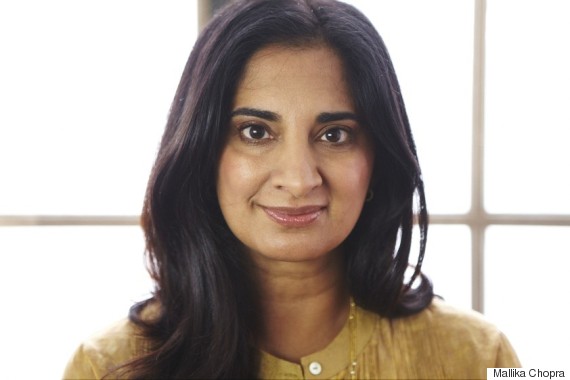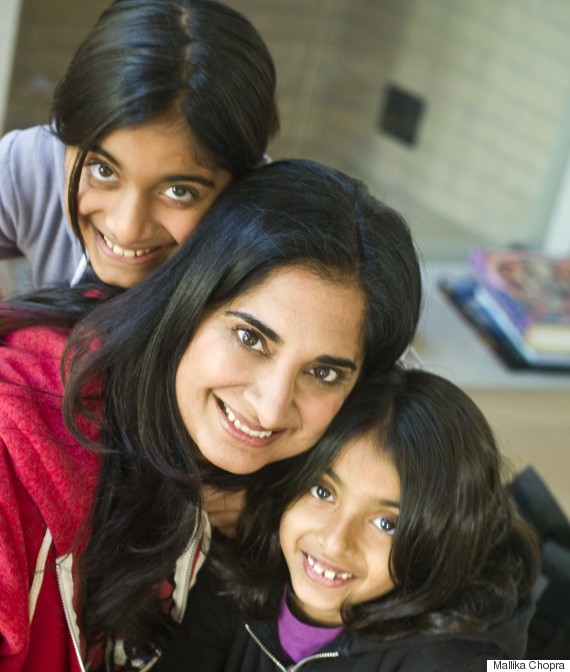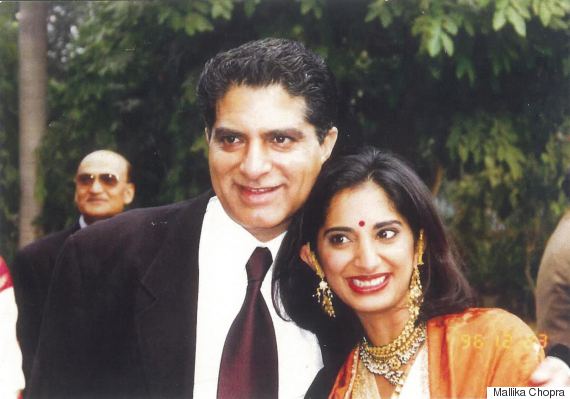
Mallika Chopra was raised to be a connected, self-aware person. But two years ago, she stood in front of a group of people, feeling eerily detached.
She was leading a meditation class and it was as if she wasn’t there.
“I was speaking in front of the audience, but I wasn’t present. I felt inauthentic. Here I was talking about health, wellness and meditation, and I probably hadn’t meditated in a year,” she told The Huffington Post in an interview. “I just stood there thinking, 'how did I get to this place?'”
She recalls the importance of that day in her latest book, Living with Intent: My Somewhat Messy Journey to Purpose, Peace, and Joy.
She wrote: “I realize I’ve in some fundamental way lost the innate sense of who I am -- or at least the sense of where I fit in, and what I’m supposed to be doing with my life. I have lost an important connection to my soul.”
Chopra, 43, is an entrepreneur and the founder of Intent.com, a website focused on personal, social and global wellness. Her books have been translated into many languages and she travels around the country speaking.
Her father, Deepak Chopra rose to fame in the 90s, writing books and teaching spirituality, wellness and meditation. His fame skyrocketed when he appeared on Oprah (today they lead meditation courses together). Described by the New York Times as a “controversial New-Age guru," he promotes alternative medicine and the mind-body connection.
For Mallika, the existential crisis that consumed her while she was teaching served as an alarm bell. “I was feeling really unanchored in my life. I got caught in my to-do list, feeling like I was so busy that I didn’t have time to talk to my parents or meet friends. And yet, at the end of each day, I didn’t know what I even did,” she told HuffPost in her kitchen in Santa Monica, California.
“Because of my father, people feel like my brother and I are experts in all this stuff. They think we meditate regularly, that we are vegan and that we live in this different plane. It couldn’t be further from the truth," she said.
The day-to-day to do’s of motherhood, wifehood, daughterhood and career demands had Chopra running on autopilot. In her book, she describes a lifestyle that relied on sugar and caffeine addictions in order to function. It was like she was moving through each day in a daze. At times like those, it can come in handy to have one of the most famous self-help gurus just a phone call away.
“It’s funny, because while the whole world goes to my father, we don’t,” Chopra said -- explaining that her mother is often the first phone call. But this time she went to her dad. They spoke for a long time and Mallika was reminded of an exercise her father used to do with them as kids. After meditating, he would guide them through a reflection. It went like this:
“I am responsible for what I see, I choose the feelings I experience, and set the goals I will achieve, and everything that seems to happen to me I ask for and receive as I have asked.”
Being children, they would ask for things like a vacation to Hawaii or tickets to an NBA game. But her father would guide them toward asking for love, connection, inspiration and purpose. “That’s what intent is for me,” she said. “It’s asking for the qualities in your life that will make you feel healthier, more connected, more fulfilled and more purposeful.”
She hadn’t asked herself these questions in a very long time and realized that focusing on intent was the piece that was missing from her life. But intents are very different than setting goals, she explained.
“Goals are task-oriented. Goals are a mental process, whereas intents really come from the soul. They come from a quiet place where we can ask ourselves ‘who am I, what do I want and how can I serve?’”
She took these questions from her childhood and embarked upon a year-long journey of discovery -- visiting her grandparents in India and interviewing people she respected in the worlds of spirituality and wellness.
The first thing she did was recommit to her daily meditation practice. She found that sitting in stillness was the most important tool she had. It was the place where she could ask herself those questions and notice when she didn’t have the answers. “I was at a place in my life where I didn’t know who I was anymore. I was this soccer mom who was running around from one thing to the other. And that’s not who I really feel I am,” she said.
“Whenever we feel the need to reinvent ourselves, we are obviously not feeling fulfilled. We are not feeling like we are on the path that is meant for us. We may have all these goals and I’ll admit, I am a competitive, ambitious person. When we ask ourselves ‘what do I want?’ often what comes back is ego-based stuff. For me it was to be this big entrepreneur and this best-selling author,” she added.
But motherhood is extremely important to Chopra. Her voice, which is already tinged with a sing-songy Indian accent, gets noticeably sweeter when she speaks about her two daughters, now 10 and 13 years old. Her face widens with pride when their names cross her lips.

Chopra with her two daughters, Tara and Leela.
She remembers being five-months pregnant with her first daughter when the 9/11 attacks happened. “Suddenly all of the joy and excitement and magic of being pregnant became really stressful,” she said. “What am I doing bringing a soul into this planet that is so full of pain and suffering and hatred?”
She returned to the question ‘who am I?’ “It was a huge transition point for me," she said. "Because if I know who I am, then I can teach my children." Chopra turned those musings into her first two books, 100 Promises To My Baby, and later, 100 Questions From My Child.
This wasn’t the first time Chopra deeply considered the question ‘who am I?’ Fresh out of college in the 90s, she helped launch Michael Jackson’s foundation, Heal The World. She traveled the globe and learned how music could change the world.
She quickly set her sights on MTV. She landed an assistant job in New York City. She spent her days copying and faxing. When she found out that MTV was launching in India, she quickly raised her hand.
She remembers it as the coolest job on the planet. Her business card could get her into any nightclub. She met her future husband at a rave in Delhi.
Then the day came when they sold their first ever sponsorship for the company. It was a big deal. “We were all celebrating and heading back to our fancy hotel in our nice, air-conditioned car -- driving through the slums -- which is very normal in Bombay,” Chopra said.
But as they drove, a group of kids blocked the road up ahead. They were stuck for an hour. “As we approached the kids, they were poor, in tattered clothing, with no shoes on and you could see the malnutrition in their stomachs,” she said. “We saw that they were mesmerized by something in a roadside stall. It was a television, literally hanging by a wire. They were watching American kids grinding to hip hop music on the beach in Santa Monica. It was an MTV show.“
Her colleagues and friends cheered. MTV had reached every corner of the planet. But Chopra said it felt like her heart had stopped. “I suddenly asked myself what am I doing? Is this how I want to serve? It really was a discomfort,” she said. “If I’m not living authentically and in a way that I feel I’m serving, then that’s not my path. So I transitioned out of there. I had no idea what I would do next. But I knew what I didn’t want to do.”

Mallika Chopra with her father Deepak at her engagement party.
She went on to do many things. She got married; they lived in India. They came back to the States and she got her MBA at Kellogg Business School. She founded Intent.com and had two children. But at 41, she felt had lost her path again.
The decision to write her third book was more of a deadline to get back on track, she explained. It held her accountable.
She set up interviews with Dan Siegel, Eckhart Tolle, Marianne Williamson and Andrew Weil and many others. She asked them about setting intents and told them about the ways she was feeling disconnected from her life. Her meeting with famed spiritual author Eckhart Tolle stood out in particular.
She flew to San Francisco to meet with Tolle. When she arrived at his hotel, Tolle's handler told her she had exactly 15 minutes to speak with him.
“When he opened the door, the first thing I noticed was that he reminded me of my dad’s father. It was such a lovely feeling," Chopra said.
They sat down and she asked one of her many well-prepared questions. But suddenly, church bells began to ring. They were in downtown San Francisco. Tolle paused and smiled. He said, “let’s listen to the bells.”
Being polite, Chopra agreed. “But I was actually looking at my phone seeing the minutes go by,” she said. “We just sat there. Five minutes, and then seven minutes. He had this really beautiful smile on his face. I was getting anxious thinking of all the questions I had prepared.”
When she set up the meeting, Chopra’s dad, Deepak, told her that Tolle is “unusual. He’s always in the now.” She didn’t understand what he meant. Leading up to the meeting, even that morning, her dad jokingly kept texting her, “he’s in the now, remember he’s in the now.”
And so, remembering this, she decided to let go. “I thought, 'Let me listen to the bells with him.' I had been so focused on my goals and tasks. We sat listening to the bells -- which were beautiful bells -- and they stopped probably 14 minutes in,” Chopra said.
Tolle’s handler knocked on the door. She remembers just accepting it all, thinking 'oh well, that is what was meant to happen.' Luckily, Tolle waved the man away and they spent over an hour speaking.
The most important thing Tolle taught Chopra was something he calls “frequency holders.” “I told him that I grew up being taught to ask ‘how can I serve and what is my unique purpose?’ In our philosophy, we have the concept of dharma, which is that we all have a unique purpose,” Chopra said. “It’s always been a stressful topic for me and I felt a lot of pressure. Especially being my father’s kid.”
Tolle told her that instead, she should think about what the universe wants of her. She said that this made her feel even more stressed. She didn’t know that answer.
She told him she felt like a soccer mom. But he had a beautiful answer for her. “He said it’s the every day people who are doing extraordinary things who raise the frequency of our planet.”
He told her that there is nothing more important you can do than to be a frequency holder. “To be the person who is providing that love and connection and security for your children and serving in that purpose. The frequency holders are the most important people. We don’t recognize them. For me, it was a really lovely, joyful acceptance of that role I had been fighting so much,” Chopra said.
Acceptance is a major character in Chopra’s book -- and journey. She battles with her sugar addiction and her distaste for exercise. She worries that she isn’t doing enough or that she’s doing the wrong things. She doesn’t like being labeled a soccer mom. She cares deeply about so many other things. But coming back to identifying her intents has brought her home.
“For me, living with intent is living a healthier, happier, joyful, more connected and purposeful life,” she said.
“When I am with my children, it’s not complicated. It’s sitting quietly for five minutes and then we ask ourselves those questions: ‘Who am I? What do I want? And how can I serve?’ I have stayed true to my meditation practice. It gives me the grounding I need every day. I have also found acceptance. Not a resigned acceptance, but a joyful acceptance of the role I’m playing right now with my children. It is a time of a lot of magic and joy.”

